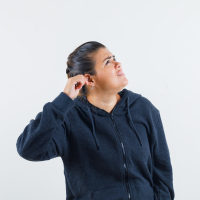
Key messages
In high-income countries, most children with acute otitis media (AOM) recover spontaneously without complications, and compared with placebo antibiotics have no early effect on pain and only a slight effect on pain in the days following.
Any benefits of antibiotics must be weighed against the possible harms: for every 14 children treated with antibiotics one child experienced an adverse event (such as vomiting, diarrhoea or rash) that would not have occurred if antibiotics were not given.
For most children with mild disease in high-income countries, an expectant observational approach seems justified.
What is AOM?
AOM or acute middle ear infection is one of the most common diseases in early infancy and childhood, causing pain and general symptoms of illness such as fever, irritability and problems feeding and sleeping.
What did we want to find out?
We wanted to find out if antibiotics are effective for relieving signs and symptoms in children with AOM.
What did we do?
We searched for studies that looked at the effectiveness of antibiotics compared with placebo or expectant observation (watchful waiting) in children aged from one month to 15 years with AOM. We compared and summarised their results, and rated our confidence in the evidence, based on factors such as study methods and effect sizes.
What did we find?
We found that antibiotics did not decrease the number of children with pain at 24 hours (when 60% of children recovered or improved), only slightly reduced the number of children with pain in the days following, and did not reduce the number of children with late AOM recurrences compared with placebo. However, antibiotics did slightly reduce the number of children with perforations (a rupture) of the eardrum and AOM in the initially unaffected ear compared with placebo. Antibiotics reduced the number of children with abnormal tympanometry (a test to evaluate how well the middle ear is functioning) findings at two to four weeks but not after six to eight weeks and three months.
There was not enough information to know if antibiotics reduced rare complications such as mastoiditis (infection of the bones around the ear). All the studies included in this review were from high-income countries. Data are lacking from populations in which the AOM incidence and risk of progression to mastoiditis is higher.
Antibiotics caused unwanted effects such as diarrhoea, vomiting and rash. It is difficult to balance the small benefits against the small harms of antibiotics in children with AOM. However, for most children with mild disease in high-income countries, an expectant observational approach seems justified.
What are the limitations of the evidence?
From the review of antibiotics against placebo, we are confident that antibiotics have no effect on pain in the first 24 hours and only a slight effect in the days following. We are only moderately confident that antibiotics reduce pain experienced 10 to 12 days after children are initially assessed. Our confidence is moderate because only one study reported this result from a secondary analysis. We are confident that antibiotics modestly reduce the number of children with abnormal tympanometry results after two to four weeks, but that they do not reduce the risk at three months. We are confident that antibiotics increase the risk of unwanted effects.
For the review of immediate antibiotics versus expectant observation, we have little confidence that immediate antibiotics reduce pain two to three days after assessment and are moderately confident that immediate antibiotics probably do not reduce pain at three to seven days. Our confidence is limited because of concerns about how some of the studies were conducted.
How up-to-date is this evidence?
Our evidence is current to 14 February 2023. The findings of this update are consistent with previous versions of the review.

